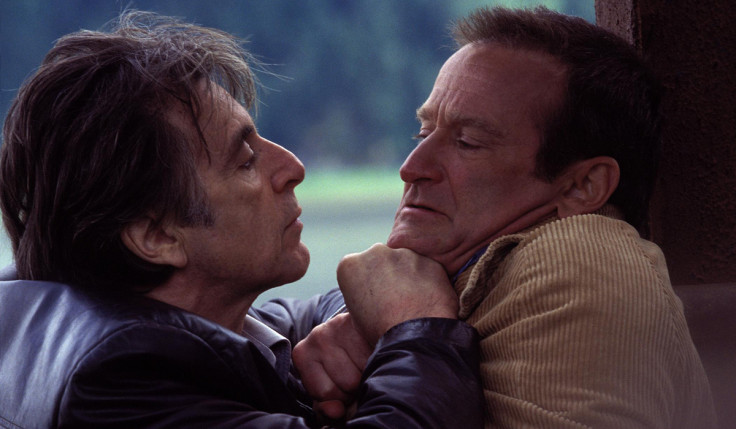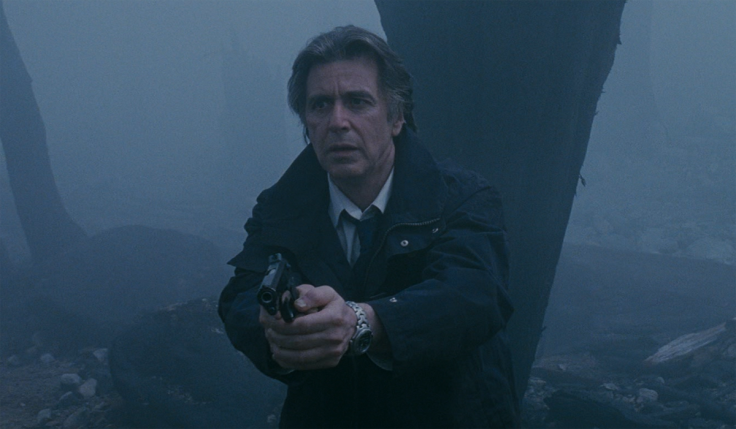Insomnia: The Films Of Christopher Nolan

In our continuing series, IBTimes UK takes a look at the work of British director Christopher Nolan in the lead up to the November release of his ninth film, Interstellar. This week we look at Insomnia, Nolan's first studio picture and an important step in a celebrated career.
Insomnia is a strange beast. It is a fairly standard police procedural with just enough of Nolan's talent and verve to make it stand out but, at the same time, it doesn't have enough to make it special.
Being his first major Hollywood feature, there's a sense Nolan was handed this remake of a 1997 Scandinavian thriller as a means to prove himself with a big budget and bigger stars. In this regard he succeeds, crafting an American remake of a foreign-language film that isn't the useless endeavour most are.
At the centre of this is the star, Al Pacino, who turns in one of his last great performances and is very much whom the film orbits. He plays Will Dormer, an LA detective dispatched to Alaska, with its perpetual daylight, to solve the murder of a local teen.
It's a standard set-up given a twist when Dormer accidentally kills his partner (Martin Donovan) while chasing the teenager's killer through thick fog. That guilt, the subsequent cover up and the fact the murderer witnessed the whole thing gives the film an edge – an edge helped no end by an unlikely co-star.

Before Insomnia, the late Robin Williams had, in the public eye, two acting modes – bats**t crazy (Aladdin, Mrs Doubtfire) and charismatic, good-natured mentor (Good Will Hunting, Dead Poets Society).
Insomnia changed that, proving the actor's worth at playing unhinged and sardonic. He gives the role his all with a viscous sarcasm undercutting every line he utters. He is more than a match for Pacino - and that's just another fine bullet point on the list of reasons Williams was a great actor.
The contention and duality between Dormer and Williams' character, Walter Finch, is just one aspect of the film that makes it stand out. Another is the insomnia of the film's title, which lays waste to Dormer as he battles an inner conflict, unsure if he's a good man, a bad man and whether he's doing the right thing.
Those two plot points could support their own films and their marriage here is certainly a reason why Insomnia is remembered, to an extent at least. But those two points wrestle for attention in the film and there's a feeling that it could have been a better, tighter film if it focused wholly on one.
Nolanisms rear their head as you would expect. Flash cuts revealing plot points that haunt our leading character are clearer here than any film of his before or since, and the opening begins – as with Following and Memento – with a close-up, albeit one intercut with shots of grand sweeping Alaskan vistas.
One scene in which Dormer scares a girl into talking also bears many similarities to a scene in The Dark Knight in which Heath Ledger's Joker circles Maggie Gyllenhaal's Rachel, telling her about how he got his scars.

Not all Nolanisms are good, though, and it's here the director's biggest fault appears. It's not true that Nolan's female characters are all undercooked or poorly motivated but it is certainly a problem. For every Mal in Inception or Catwoman in The Dark Knight Rises there is an Ellie Burr in Insomnia.
Hilary Swank's Burr is under-served by a script that depicts her as a good detective who hero worships Dormer. There's nothing inherently wrong with that, but she is given very little personality and her seeing her idol fall is never the source of drama it could have been.
Classic Nolan themes of inner turmoil and duality between two men are clearly evident, making it a perfect project for the director. As would be proved with his later work, Nolan operates best when working with more freedom and confidence – whether he's adapting a known work or creating his own.
This is most evident in Insomnia's ending, which so easily could have been left unclear but instead made its message and meaning crystal clear, coming across as a standard Hollywood lecture in ethics rather than provoking the kind of complex discussion his body of work would become famous for.
Next week - Batman Begins.
© Copyright IBTimes 2025. All rights reserved.






















